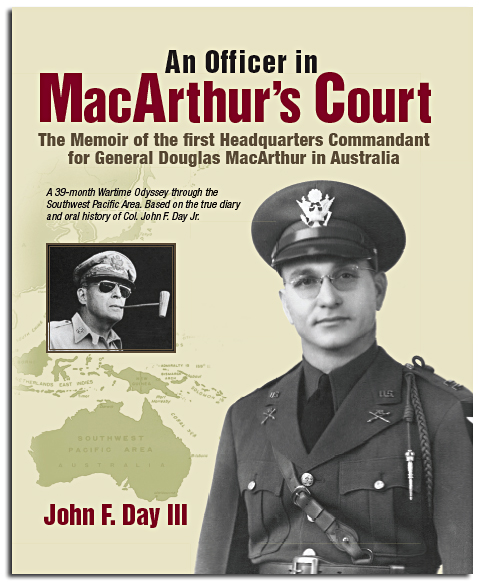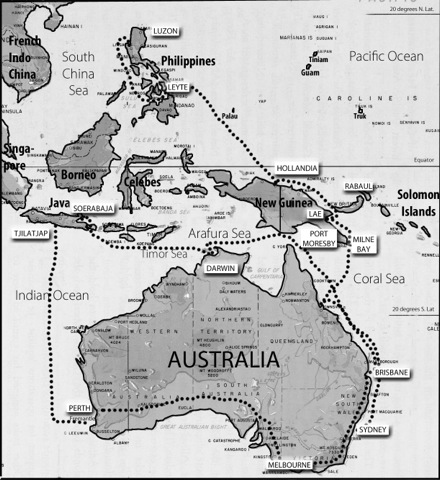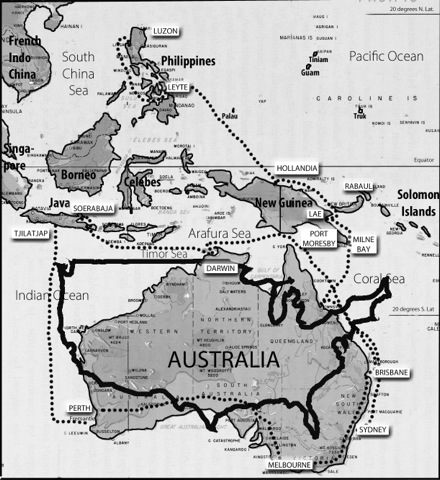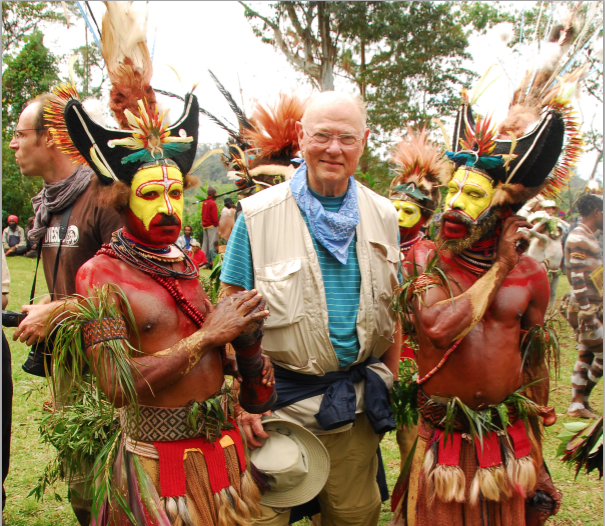-
An Officer in
MacArthur's Court
A Memoir of the first Headquarters Commandant for
General Douglas MacArthur in Australia
by John F. Day III
A 39-month Wartime Odyssey through
the
Southwest Pacific Area.
Based on the true diary and oral history
of Col. John F. Day Jr.
First Lieutenant John F. Day Jr. was a 30-year-old Reserve Army Officer when he was called to active duty in November 1940. On December 7, 1941, Day found himself aboard a troop ship in the mid-Pacific in route to the Philippine Islands. The USS Republic, a ship in the Pensacola Convoy, was eight-days out of Pearl Harbor sailing to re-enforce Gen. Douglas MacArthur. The Japanese attack altered the voyage and changed Day’s life.
This is the story of Day’s three-year odyssey to reach Manila. After dodging Japanese bombs and strafing attacks in Java, Day escapes to Melbourne where he arrives two days in advance of Gen. Douglas MacArthur’s arrival from Corregidor. As one of few U.S. Army officers in Australia, Day is appointed the first Headquarters Commandant for Gen. MacArthur to support the Allied counter offensive. As a keen observer of people, Day follows the antics of the generals and the personalities of GHQ, while his heart remains firmly with the foot soldiers in the jungle. Day’s journey takes him across Australia, New Guinea, and the Philippines. Only the atomic bomb spares him from joining the invasion force for Japan.
~ ~ ~
The story is told through Day’s original diaries, letters, and oral history as he shares his frustrations, fears, and loneliness. His narrative is supported by collateral research describing the historical events that swirled about him.
|

482 pages, 7.5" x 9.25"
161 photos
ISBN: 978-1-61170-176-0
Publisher: Robertson Publishing |
There are few 20th century Americans more controversial than General Douglas MacArthur and yet his leadership in the neglected Southwest Pacific theatre of the Second World War remains one of the least studied aspects of the conflict. The publication of Major John F Day Jr.’s fascinating diary and letters is a valuable contribution to our knowledge of the inner workings of MacArthur’s GHQ, from the unique perspective of a junior officer not enthralled by the “Bataan gang” and with great empathy for the combat troops he’d once been part of before he was elevated to the role of Headquarters Commandant.
The author has added significant contextual information which makes clear what was unfolding in the Southwest Pacific frontlines from Java to the Philippines, at times far from the intense office politics of GHQ in Brisbane.
— Karen Nunan, Curator, MacArthur Museum Brisbane Brisbane, Australia
|
Purchase "An Officer in MacArthur's Court" from any of the links below: |
|
|
|
|
What a great book! It is a very personal story, written by the army officer's son, based on his father's letters, diary entries and an oral history. It mixes the basic day to day routine with the drama of bombs falling and people diving for cover in a ditch. Officer Day was involved with the logistics of the war, getting the supplies needed for the generals, and gearing up for major campaigns. He was on the front lines, saw a lot and kept good notes. The author did his part too, with an incredible amount of research that keeps the story connected to the war effort in the South Pacific. You will learn so much. I know I did.~ Gary Hedden
This is an amazingly interesting novel-like diary and oral history of the Second World War in the Southwest Pacific Area. The readers’ anticipation level remains extremely high throughout the book. The author’s father, writing for his wife and very young son relates his daily experience after the bombing of Pearl Harbor to the planning for the invasion of Luzon in the Philippines. Over fifty years later, his now retired son began the odyssey, retracing his fathers’ footsteps, becoming an expert on the journey. He has very efficiently integrated details of the War, explanation of his fathers’ journey and its aftermath, and made a potentially boring war story into an exciting, understandable trip. I highly recommend this book to anyone! ~ Shirley Steele
Tom Brokaw named the military veterans and the country that supported them during World War II “The Greatest Generation.” While access to official documents regarding the conflict is now available, Los Altos resident John F. Day III has preserved the human side of the war.
In his new book, “An Officer in MacArthur’s Court: The Memoir of the First Headquarters Commandant for General Douglas MacArthur in Australia” (Robertson Publishing, 2014),” Day collects the diaries and notes that his father, Col. John Day Jr., wrote during the course of the Pacific War through the Japanese surrender Sept. 2, 1945, on the USS Missouri in Tokyo Bay.
Day’s account begins nearby in San Francisco, where as a 5-year-old, he and his mother, Cile, returned his father’s wave from the deck of the USS Republic as the ship sailed for Hawaii Nov. 21, 1941, under orders to support Gen. Douglas MacArthur’s Far Eastern Command. The U.S. was not at war that day. ... Read the rest of the article
|
Table of Contents — Major Sections
- Orders To The Pacific– 23 Oct 1941
- The Pacific Journey– 21 Nov 1941
- Pearl Harbor Attack– 7 Dec 1941
- Japan’s Military Tsunami – December 1941
- Brisbane Arrival – 22-29 Dec 1941
- Passage To Darwin – 28 Dec 41 To 11 Jan 42
- Japanese Conquest Of Nei
- Field Artillery Arrives At Camp Singosari – 11 Jan 42
- Japan Encircles Java
- Escape From Java – 25 Feb 1942 To 4 Mar 1942
- Japan Invades Java
- At Sea – Aboard The MS Abbekerk
- Java Falls To The Japanese
- Australia, At Last – 4 March 1942
- MacArthur Departs The Philippines
- Army Organization – Jan 1942
- Melbourne, USAFIA, and USAFFE – 19 March 1942
- MacArthur’s War Resources – 8 May 1942
- Melbourne Developments – May – Jun 1942
- War Momentum Shifting – Jun 1942
- The Home Front – Texas - 1942
- USAFFE GHQ Moves To Brisbane – July 1942
- Japanese New Guinea Offensive – Jan 1942
- Brisbane & GHQ– 23 July 1942
- The Female Receptionist – 1 Aug 1942
- First Sign Of Cile’s Medical Problem – Sep 1942
- New Guinea Campaign Goes Badly – Sept 1942
- Battle Of Bismarck Sea – 2-4 Mar 1943
- The Third Desk For The Receptionist – Mar 1943
- Polio Outbreak At Home In Texas – 13 Aug 1943
- New Guinea, Here I Come
- The Lae Invasion & Base E – 4 Sep 1943
- Marshall And MacArthur Meeting – 13 Dec 1943
- Lae Area Commander, Base E – Jan 44 To Aug 44
- Hollandia – 22 Apr 1944
- Leyte Invasion & Ascom – 20 Aug 1944
- Cile’s Medical Problem Revealed – 25 Dec 1944
- Luzon Invasion - 9 Jan 1945
- Command And General Staff School (C&Gs)
- Planning The Invasion Of Japan
- Legion Of Merit – 10 Aug 1945
- Epilogue
- Bibliography
- Index
- About the Author
|
|
The Travels of Capt. John F. Day Jr. — 1941-1945
 |
 |
| This is the journey described by John F. Day Jr. in the book. |
Same Map with USA superimposed. To provide sense of scale. |
|
Details of the Journey
- San Francisco, California USA to Brisbane, Australia (1941)
- Brisbane, Aust. to Darwin, Aust. to Soerabaja, Java (1941-1942)
- Tjilatjap, Java to Fremantle, Australia (1942)
- Perth to Melbourne, Australia (1942)
- Melbourne to Brisbane, Australia (1942)
- Sydney, Australia to Milne Bay, New Guinea (1943)
- Milne Bay to Lae, New Guinea (1943)
- Lae, Papua New Guinea to Hollandia, Dutch New Guinea (1944)
- Hollandia, Dutch New Guinea to Leyte, Philippine Islands (1944)
- Leyte to Lingayan Gulf, Luzon, Philippine Islands (1945)
- Manila to Tacloban, Philippine Islands (1945)
- Tacloban, Philippine Islands to San Francisco, California USA (1945)
|
Back to Top
|
|
The author John Day III with his father John F. Day Jr.
|

About the Author
John Day III
John F. Day III lived in Bonham, Texas during World War II with his mother and grandparents while his father, John F. Day Jr., was on Gen. MacArthur’s staff in the Southwest Pacific. When the war ended, the family moved to Ft. Sam Houston, Texas and later Ft. Bragg, North Carolina. Day attended the Massachusetts Institute of Technology where he earned both a B.S. in physics and an M.S. in mechanical engineering (thermodynamics). Upon graduation, he received an ROTC commission and served his obligation in the U.S. Army Corps of Engineers, reaching the rank of captain.
After discharge, Day worked as an engineer on several classified military airborne and satellite reconnaissance systems. He returned to school at the Stanford Graduate School of Business where he received an M.B.A. He enjoyed a 35-year career as a marketing executive, entrepreneur, and publisher. His publishing company produced technology newsletters, market reports, seminars, and conventions for the semiconductor industry for 22 years. He retired in 2001.
In retirement, Day has pursued his interest in genealogy, history, and DNA. His genealogy interests led him to publish a family story in the Magazine of Albemarle History (Virginia). His fascination with World War II led to an extensive investigation into his father’s World War II experiences, travel to Australia and Asia, and eventually this book. He is also the worldwide coordinator for the Day family DNA project at Family Tree DNA.
Day lives in Los Altos, California with Stephanie, his wife of 60 years. They have two adult children and four grandchildren. |
|
|
|
|
|